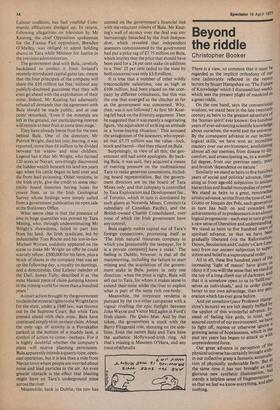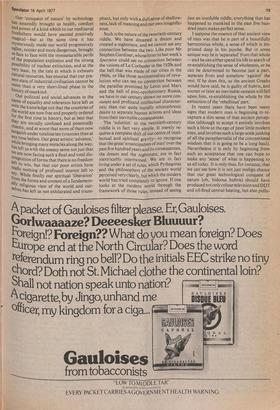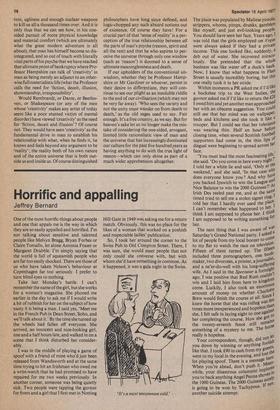Beyond the riddle
Christopher Booker
There is a view, so common that it must be regarded as the implicit orthodoxy of our time (admirably reflected in the recent lecture by Stuart Hampshire on `The Future of Knowledge' which I discussed last week), which sees the present plight of mankind as a great riddle.
On the one hand, says the conventional wisdom, we stand here in the late twentieth century as heirs to the greatest adventure of the `human spirit' ever known : five hundred years of ever-advancing scientific knowledge about ourselves, the world and the universe. By the consequent advance in our techn0' logical skills, we have won an incredible mastery over our environment, annihilating almost all our enemies, from disease to discomfort, and emancipating us, to a wonderful degree, from our previous nasty, poor and brutish `dependence on nature.'
Similarly we stand as heirs to five hundred years of social and political advance,
liber ating us from age-old subjection to ancient hierarchies and feudal monopolies of power. We stand as heirs to a great, remorseless artistic advance, so that from the time of, saY, Giotto or Josquin des Pres, each generation
in turn has built on and extended the achievements of its predecessors in an almost logical progression—each step in turn giving anew sense of liberation and understanding;
We stand as heirs to five hundred years 01 spiritual advance, so that we have been gradually liberated (via the Reformation, Deism, Secularism and Couldn't-Care-Lessism) from our ancient subjection to suPera stition and belief in a supernatural order. All in all, these five hundred years of the increasing `light of reason' have given us (deny it if you will) the sense that we stand 3, the top of a long climb out of darkness, anu that it is somehow open to us to `fulfil 01-11' selves as individuals,' and to order things better to our own advantage, than any gen. eration which has ever gone before. And yet somehow (pace Professor HarnPshire's lecture) we are left deeply baffled bY the upshot of this wonderful advance. J. stead of feeling like gods, in total, sehe assured control of our environment, we 'lava to fight off, repress or otherwise lgnnre,e growing sense of hopelessness, which,„ , past ten years has begun to attack us wit" unprecedented force. Our great advance in perception pf the physical universe has certainly broughtwITin our collective grasp a fantastic accunn.114_t tion of physically undeniable facts. But the same time it has not brought us r.t glorious new synthetic illumination, nu merely a helpless sense of fragmentatimr: so that we feel we know everything, and alsv nothing. Our 'conquest of nature' by technology has assuredly brought us health, comfort and power of a kind which to our mediaeval forefathers would have seemed positively magical—but at the same time it has mYsteriously made our world progressively uglier, noisier and more dangerous, brought us face to face with the immeasurable perils of the population explosion and the strong Possibility of nuclear extinction, and at the very least, by the rate at which it exhausts natural resources, has ensured that our present state of industrial civilisation cannot be More than a very short-lived phase in the history of mankind.
Our political and social.advances in the ritile of equality and toleration have left us `Arlth the knowledge not that the countries of tile world are now free and properly ordered fOr the first time in history, but at best that theY are socially confused and potentially Fhaotic, and at worst that more of them now languish under totalitarian tyrannies than at any time before. Our great artistic 'advance,' while bringing many miracles along the way, has left us with the uneasy sense not just that \Ye are now facing such a final and total dis!ntegrat ion of forms that there is no freedom 'eft to win, but that our poor artists have reanY nothing of profound interest left to ,S.ay. While finally our spiritual 'liberation' lrom the forms and content of a fundamentallY religious view of the world and ourselves has left us not exhilarated and trium
phant, but only with a dull sense of shallowness, lack of meaning and our own insignificance.
Such is the nature of the twentieth-century riddle. We have dreamed a dream and created a nightmare, and we cannot see any connection between the two. Like poor Mr Stephen Gardiner, whose letter to last week's Spectator could see no connection between the visions of Le Corbusier in the 1920s and the hell that was made of our cities in the 1960s, or like those sentimentalists of revolution who can see no connection between the paradise promised by Lenin and Marx and the hell of post-revolutionary Russia, we have in our century shown no more consistent and profound intellectual characteristic than our quite literally schizophrenic desire to separate human actions and ideas from their inevitable consequences.
The 'solution' to the twentieth-century riddle is in fact very simple. It merely requires a complete shift of our centre of intellectual and spiritual gravity—to recognise that the great 'emancipation of man' over the past five hundred years and its consequences, the dream and the nightmare, are in fact inextricably intertwined. We are in fact Living under a set of rules, which Pythagoras and the philosophers of the ancient world perceived very clearly, but which the modern world has tried completely to ignore. If one looks at the modern world through the framework of those rules, instead of seeing
just an insoluble riddle, everything that has happened to mankind in the past five hundred years makes perfect sense.
I suppose the essence of that ancient view of man was that he is part of a beautifully harmonious whole, a sense of which is imprinted deep in his psyche. But in some unique way he is 'separated' from that whole —and he can either spend his life in search of re-establishing the sense of wholeness, or he can be determined to become just a part, separate from and somehow 'against' the rest. If he does this, as the ancient Greeks would have said, he is guilty of hubris, and sooner or later an inevitable nemesis will fall upon him, re-establishing the whole by the extinction of the 'rebellious' part.
In recent years there have been many signs that modern man is beginning to recapture a dim sense of that ancient perception (although to accept it entirely involves such a blow to the ego of poor little modern man, and involves such a large-scale junking of all the paraphernalia of the conventional wisdom that it is going to be a long haul). Nevertheless it is only by beginning from such an acceptance that one can hope to make any 'sense' of what is happening to us all today. It is only thus, for instance, that we can see how it is not just malign chance that our great technological conquest of nature (oh, hideous hubris) should have produced not only colour television and DDT and oil-fired central heating, but also pollu
tion, ugliness and enough nuclear weapons to kill us all a thousand times over. And it is only thus that we can see how, in his onesided pursuit of more physical knowledge and material comfort (which are ultimately what the great modern adventure is all about), that man has himself become so disintegrated, and so out of touch with literally vital parts of his psyche that we have reached that ultimate point of bankruptcy where Professor Hampshire can talk of 'creativity' in man as being merely an adjunct to an otherwise full materialistic life (what the Professor calls the need for 'fiction, deceit, illusion, showmanship, irresponsibility'.
Would Rembrandt, or Dante, or Beethoven, or Shakespeare (or any of the men whose 'creativity' makes any artist of today seem like a poor stunted victim of mental disorder) have viewed 'creativity' as the need for `fiction, deceit and illusion'? Of course not. They would have seen 'creativity' as the fundamental drive in man to establish his relationship with what, when he finds it, he knows and feels beyond any argument to be 'reality'; the reality both of his own nature and of the entire universe that is both outside us and inside us. Of course distinguished philosophers have long since defined, and logic-chopped any such absurd notions out of existence. Of course they have! For a crucial part of that 'sense of reality' is a perception of the true relationship between all the parts of man's psyche (reason, spirit and all the rest) and that he who aspires to perceive the universe through only one window (such as 'reason') is doomed to a sense of ultimate meaninglessness and death.
If our upholders of the conventional unwisdom, whether they be Professor Hampshire or Mr Gardiner or whoever, persist in their desire to differentiate, they will continue to see our plight as an insoluble riddle to the end of our civilisation (which may not be very far away). 'Who sees the variety and not the unity must wander on from death to death,' as the old sages used to say. Fair enough. It's a free country, as we say. But for heaven's sake let us no longer make the mistake of considering the one-sided, arrogant, limited little rationalistic view of man and the universe that has increasingly dominated our culture for the past five hundred years as having anything to do with the true light of reason—which can only shine as part of a much wider apprehension altogether.








































 Previous page
Previous page